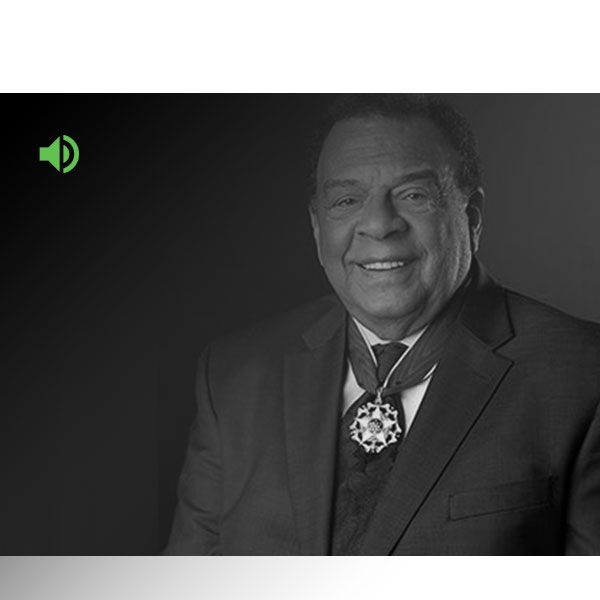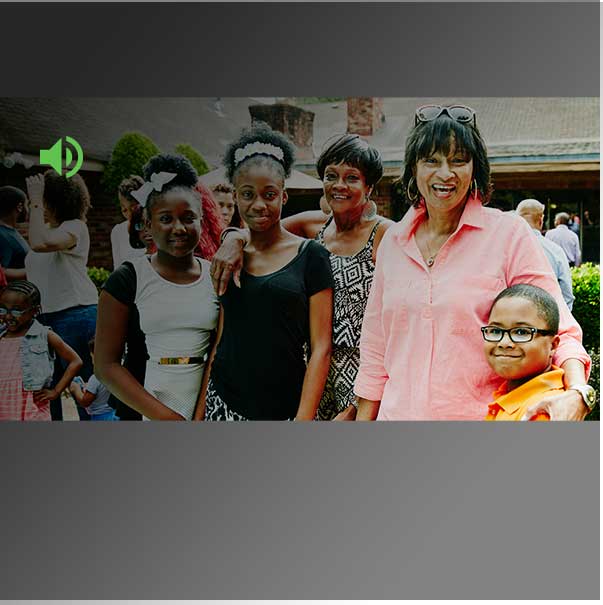How much progress has actually been made on racial equity? Has the U.S. been too focused on symbolic progress? Marc Morial, president of the National Urban League and former mayor of New Orleans, joins the podcast to discuss what he views as the top priority to address racial disparities and what gives him hope for the future of equity.
Below is a full transcript of the conversation, including time stamps. Full audio is posted above.
Mohamed Younis 00:07
For Gallup, I'm Mohamed Younis, and this is The Gallup Podcast. In this episode, we speak to a living legend on social change in America and how much progress has really been made on racial equity across the United States. Marc Morial is president of the National Urban League and the former mayor of the city of New Orleans. Marc, it's a pleasure to speak with you again sir.
Marc Morial 00:28
Hey, thank you very much and it's an honor to be with you.
Mohamed Younis 00:31
Let's just start with a really, kind of a token question but one that always comes up. I recently watched a fascinating documentary called MLK FBI. I suggest everyone to see that. One of the things that was fascinating to me is a question both Dr. King and a couple of the other civil rights leaders in the really old black-and-white footage kept getting was -- and this is like, you know, in the '60s -- hasn't there been a lot of progress made already on race relations? It's just struck me, Marc, that we're still getting asked and asking that question in this country. So I had to start with that. In your view, hasn't progress been made? And if so, not enough? How much? What are your feelings?
Marc Morial 01:14
It's a very fair question, and it's a question we need to continue to keep asking until we get to a situation where we have parity in America, where we do in fact have racial justice, in a sense of a more equitable and equal nation. I would say this: Sometimes it's tough to answer this question, because those of us that live and interpret the present didn't live in the past. So I was a toddler and a child in the 1960s, too young to really be fully conscious of living conditions and the system of the community -- my beloved New Orleans, a Southern city where I grew up. My perspective came from my parents and grandparents and aunts and uncles and friends and neighbors, who talked about those times. It is absolutely disrespectful to the legacy of those that fought hard in the 1960s to suggest that progress has not been made. But it's absolutely as inaccurate to suggest that the progress that has been made has eradicated slavery, segregation, racism and all of its vestiges.
Marc Morial 02:39
So it's a bit of a paradox. We have made change in many, many respects. But we who live and interpret the present did not live in the past. Very few people living today -- my mother is almost 90; she's 89, lived her first 30 years of her life in a segregated America. She has a present sense of it. She has a sense of it. And so I talk to her a lot, and she talks about progress, but then she's deeply concerned about the retrenchment we see today -- deeply, deeply concerned about it; has a great sense. So she's sort of my, my guru, my, my, my source, because she represents the thinking of that generation, and she's still strong and vital and aware and, and opinionated and informed. So we have to count the success we've made as a nation. But we have to learn and remind ourselves over and over again: Progress made is never guaranteed.
Mohamed Younis 03:57
America went through a really wild roller coaster ride with electing the first black president. What a high. You know, people that didn't even vote for him were proud that the country had crossed that really important line. I mean, it's a symbolic gesture; it's a symbolic thing, but it's way more than symbolism. And I say that as somebody sitting here in Washington D.C., down the street from the White House. And there was a lot of hope, a lot of pride. You look at things today, Marc, and boy, are we in a different moment in race relations in America.
Marc Morial 04:38
It was a Goldilocks moment in American history, the day that President Obama was elected and the day he was inaugurated. It was an unimagined moment, it was an unforeseen moment because it would not have been predictable 12 months earlier or 24 months earlier. Having said that, it was much more than a symbolic victory. Let's witness today, you have a Joe Biden, who was part of the Obama administration, who's a president who's been explicit about racial equity and racial justice. He just nominated the first African American woman to be a member of the Supreme Court. He nominated the first African American woman to be vice president of the United States. He nominated the first African American woman to be a member of the Federal Board of Governors. I got to think that Joe Biden was influenced and impacted by his service during the Obama years.
Marc Morial 05:45
So we've got to understand that it was a proud moment. But it also spawned a narrative we see in America many, many times, and that is a backlash. And that backlash was symbolized by the rhetoric, the policies and the politics of Donald Trump. He channeled that backlash and that anger. He began it by questioning -- which was absurd, but we knew exactly what he was doing in questioning Barack Obama's citizenship in 2011 and 2012. So now we've got friction in America, we've got a battle in America, and I like to think the battle is between progress and tradition, between the future and the past. And it is not a new battle; there were these types of battles in the 1960s, these types of battles in the 1850s, '40s, '50s, '60s, '70s, '80s. It's a continuing battle in America, a continuing struggle in America.
Marc Morial 07:01
And I think it's not simply a political struggle. I don't think it is even simply a racial struggle. I think it's also a struggle of morality -- about right, and there is a right, and there's a wrong, when it comes to how people are treated, and whether race is going to be the overriding, if you will, arbiter of opportunity -- economic opportunity, quality-of-life opportunity, the opportunity to participate in power in this country.
Mohamed Younis 07:33
I'm gonna really, I'm gonna really piss you off right now, Marc, because I want, I want to push back, I want to push back. I'm gonna say, absolutely. But, but the question is, is America obsessed with breaking that first barrier more than we have been obsessed with the life outcomes of Black communities across the country, in the sense that abso -- of course, these things are not just symbolic. But we're also living at a time in this country where people have a lot less confidence in national government than they used to. So it is absolutely critical to diversify the perspectives -- I mean, just for national security interests, to diversify the perspectives of people running the show here in the United States on every level -- whether it's private sector, the government, local government. But that hasn't resulted in the kind of life-outcome improvements you, your organization and so many have been working so hard on for generations. Just reflect on that.
Marc Morial 08:43
So I don't disagree with your point at all. In fact, I fully agree with it. The victories of -- can seem symbolic, can seem inadequate, given the overall life conditions, the persistence of the racial wealth gap, the spike in the rise in hate crimes, the fact that workplace discrimination based on race is alive and well in America today. There is absolutely no doubt that you make a great point. Nonetheless, I never trivialize these achievements and accomplishments, because the hope and the desire is that they are door-opening and they will lead to the ability of others. In the power game, the question is, when you get to the table, what will you do? Will you use the power to bring about overall systemic change? Or will you view it as an individual or singular success? And that is a question that remains with us at present and to this day.
Mohamed Younis 10:01
And it's, it's one of those conundrums really of, I don't even want, I say minoritized groups in history, right? It's like you going for change or you change from the outside. I want to ask you about something most people probably do not ask an American civil rights leader that's focused on the condition of people of color in this country. Does Ukraine matter to Black people in America -- what's happening in Europe -- and if so, how?
Marc Morial 10:31
Ukraine matters, because what is occurring in Ukraine is an attack on an independent sovereign democratic state by an autocratic leader. An autocratic leader, who I might add participated in 2016 and orchestrated a pernicious voter suppression campaign online to deceive Black voters; a pernicious leader who has buddied up to Donald Trump and who finds comfort in a relationship and, with Donald Trump and there's reciprocity around that. And this is really a referendum on 21st century democracy, and that is can another state -- this smacks of old-worldism, in a fashion that I don't think any of us have seen.
Marc Morial 11:32
Unprovoked, for no reason whatsoever, you invade with your, with the full might of your military, a sovereign, independent nation that's next door to yours without any support from any other country in the world. And then you face universal condemnation, stifling economic sanctions, sanctions and restrictions on the ability of your planes to fly over neighboring countries, and you're prepared to place your own people at risk and in harm's way because of your appetite for power.
Marc Morial 12:18
Yes, we need to recognize that this love of autocracy is also embraced by some here in the United States, namely, the 45th president of the United States. Birds of a feather flock together. Peas in a pod nudge up to each other. So, Black people should be concerned but also not distracted into believing that Ukraine is the only issue, the only issue and the sole focus of our government. We can't allow attention to be taken off of health disparities, economic disparities, education disparities and the attack on voting rights right here at home.
Mohamed Younis 13:10
I'm so happy that you made that connection, because I think that those of us who haven't taken the time to really look into, you know what, what, what the intelligence community has confirmed was an influence campaign, and the role that nefarious actors played in exacerbating internal divisions in the United States, and racial tensions were one of the most focused-upon areas.
Marc Morial 13:41
It was the intentionality of Russia to fan the flames of racial division. They created a propaganda campaign that played on both sides of the issue, as you know, and it is disappointing to me that neither the Congress nor the mainstream media spotlighted and highlighted the essential methodology that Russia used to interfere in our election. People got focused on whether they were messing with the results. No, they were running a classic Soviet-style disinformation and propaganda campaign -- the same type they've used in Eastern Europe and the old Soviet bloc for ages. They master it, and they mastered it in 2016.
Marc Morial 14:36
And this is the intent. They were willing to try to suppress the African American vote with propaganda campaigns, posing as, like Black Lives Matter activists and saying to people, "Don't vote." And then when the election came close, they said, "Well if you have to vote, vote for one of these third- or fourth-party people." They were clearly trying to affect the outcome in the same way in which they were involved in French presidential politics, Brexit, Scotland -- all throughout Europe, it's been their modus operandi. And I just feel that we have to continue to talk about this to educate people about the perniciousness of this, and the fact that there's tacit collaboration between the Russians and some elements here in the United States.
Mohamed Younis 15:37
Marc, I want to end with you -- as I always love to, with reading all of what you put out and watching your speeches -- a word of hope. What gives you hope for the future of racial equity in this country?
Marc Morial 15:54
Without hope, we have nothing. But what truly gives me hope is young people. I saw young people of all backgrounds, races, colors and creeds take to the streets during the George Floyd uprising. I've seen young people voice that they want institutions and companies that they either work for or who are the beneficiaries of their spending to reflect the values that they reflect. I see once again an opportunity for an emerging generation to change the country. It's what gives me the hope. But it isn't easy, it isn't automatic and it's probably far more difficult than even the generation of Martin Luther King and Whitney Young and John Lewis believed. Because you can't legislate love. You can't legislate conduct. You can't orchestrate attitudes. But you can prevent. And so we face that in the country -- our policies, and the danger we have now is when policies that promote racial justice and equal participation are being undermined by state legislatures, by the United States Supreme Court, and by political actors in the country who use fake, phony and specious arguments to suppress votes or to undermine democracy. So we have at this time, I have faith in tomorrow's generation, and I think we have to lift them, we have to encourage them, and we have to support them.
Mohamed Younis 17:45
Marc Morial, president of the National Urban League. Sir, thank you for being with us on the show.
Marc Morial 17:50
Thanks for having me.
Mohamed Younis 17:58
That's our show. Thank you for tuning in. To subscribe and stay up to date with our latest conversations, just search for "The Gallup Podcast" wherever you podcast. And for more key findings from Gallup News, go to news.gallup.com or follow us on twitter @gallupnews. If you have suggestions for the show, email podcast@gallup.com. The Gallup Podcast is directed by Curtis Grubb and produced by Justin McCarthy. I'm Mohamed Younis, and this is Gallup: reporting on the Will of the people since the 1930s.



